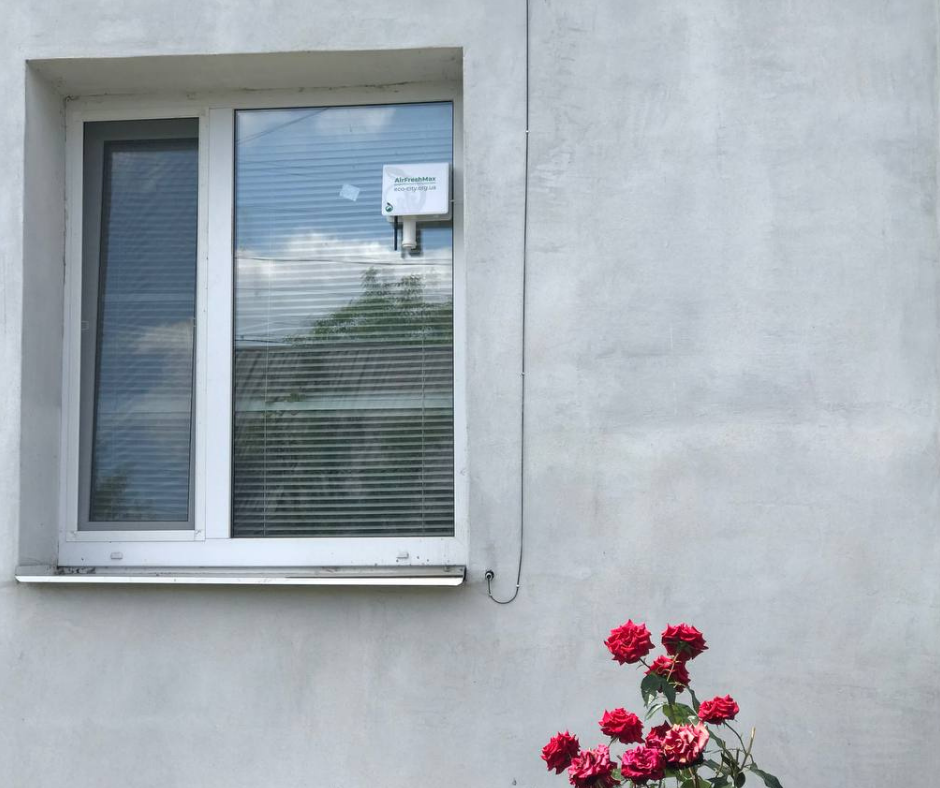It would be much easier for Rivne and Ostroh residents to monitor air quality: nine public air pollution monitoring posts were installed in Rivne, villages Obariv and Horodok. One post is going to be installed in Ostroh as well. Those devices provide real-time air pollution with formaldehyde, nitrogen oxide, dust, and radiation. The NGO Ecoclub together with the international project “Clean Air for Ukraine” with the support of the Czech NGO “Arnica” initiated the development of a public air monitoring network in the Rivne region.
One of those who set up a monitoring post is Andrii Ovsiychuk — resident from Horodok. The man claims that until recently environmental monitoring was completely absent in the village. Andriy Ovsiychuk’s house is located in a few meters from the newly build Kronospan woodworking plant. Plant is about to became fully operation, which concern the locals.
“Last year, the plant installed its own monitoring post, but often its data is questionable (always showing zero pollution), or temporarily unavailable. That is why we, the concerned residents, together with public organizations launched the objective monitoring in Horodok. This allows us to be sure in air`s safety in our village,” says Andriy Ovsiychuk.
There are three state air pollution monitoring posts in Rivne. All observation stations are located in the parts of the city with heavy traffic: Nebesnaya Sotnya, Mlynivska, and Hrushevsky streets. Rivne Regional Center for Hydrometeorology measures levels of air pollution in the city, whose employees manually take samples, and report the results once a month. The Department of Ecology and Natural Resources of the Rivne Regional State Administration publishes data on pollution once a quarter.
“Reports on the state of the environment show a stable exceed of the level of pollutants: for example, during 2021 in Rivne, formaldehyde levels were exceeded by 2-4 times. Since government air monitoring posts do not allow us to monitor the state of pollution in real-time, it is important to have truly operational monitoring. We hope that the monitoring stations will not only inform citizens about the state of the air but also become a real tool for influencing its quality,” says Nataliya Kholodova, campaigner of the NGO Ecoclub.
Public air monitoring is a network of posts that are installed by residents of a settlement on residential buildings, office premises, schools, churches, etc. Such networks allow making the accurate measurement of air pollution in different settlements.
Public air quality monitoring posts are modern tools that can be installed by anyone independently of the state or local authorities. Contrary to Rivne’s state monitoring, such posts provide quick access to information about air quality and show reliable data on several main pollutants in real-time.
Some projects (such as Ecocity) inform about air pollution levels by creating online maps, which inform whether it is safe to be outside for vulnerable/non-vulnerable population groups. Public monitoring posts measure the main pollutants such as fine dust (PM 10 and PM 2.5), carbon monoxide (CO), nitrogen oxide (NO2), ammonia (NH3) and ozone (O3). Such devices can measure pollutants specific to a certain territory: for example, formaldehyde near woodworking enterprises, or the radiation level near nuclear plants.
“During the war, when the enemy can attack any part of the country with missile strikes, it is especially vital to inform the public about air quality. Currently, Ukraine has 214 public air quality monitoring stations that transmit real-time online information about air quality,” says Oleksiy Terlevskyi, curator of the EcoCity public air quality monitoring network.
How to participate in public monitoring?
Anyone can participate in public monitoring. All you need is to purchase a monitoring station and install it on your building. Technical support from the NGO “Clean Air for Ukraine” will help to set up the post and connect it to the network. To receive the equipment for free, public organizations, universities, and municipalities can apply a request to Clean Air for Ukraine.
Contacts for additional information:
Natalia Kholodova, Ecoclub’s campaigner,
natalia@ecoclubrivne.org | 0 (98) 787 40 54
Yulia Huzii, Ecoclub’s communication manager,
julia@ecoclubrivne.org | 0 (68) 758 98 89
Tetyana Zhavzharova, “Clean Air for Ukraine” project’s comunication manager.
ecosense.ngo@gmail.com | 0 (99) 756 18 95











